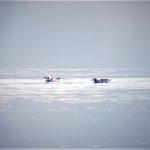It couldn’t have happened differently. During its last weekend for 2020, 𝗕𝗶𝗿𝗱𝗜𝗗 𝗔𝗹𝗯𝗮𝗻𝗶𝗮 concluded the 9th and 10th sessions with impressive observations in terms of both quantity and variety.
𝗧𝗵𝗲 𝗩𝗷𝗼𝘀ë-𝗡𝗮𝗿𝘁ë 𝗣𝗿𝗼𝘁𝗲𝗰𝘁𝗲𝗱 𝗟𝗮𝗻𝗱𝘀𝗰𝗮𝗽𝗲 never disappoints when it comes to giving you magical bird flights, endless flocks of waders that occupy the corners of the Salinas, and it looks as though they are communing with one another. And as we get a little closer to the flocks, thousands of individuals of the European golden plover illuminate the water surface with their reflection. Of course, in this natural avian competition, it is also worth mentioning the mesmerizing performance of the Northern lapwing, which immediately steals the attention of those present, leaving everyone breathless.
We could not conclude this session without visiting 𝘁𝗵𝗲 𝗮𝗴𝗿𝗶𝗰𝘂𝗹𝘁𝘂𝗿𝗮𝗹 𝗹𝗮𝗻𝗱𝘀 𝗶𝗻 𝗔𝗸ë𝗿𝗻𝗶, thus presenting the importance and values that they have in regards to birds. This sparked debates about the 𝗩𝗹𝗼𝗿𝗮 𝗔𝗶𝗿𝗽𝗼𝗿𝘁, analyzing every implicit aspect. Of course, with their participation in BirdId and especially the knowledge they have gained so far, the students are much more sensitive to such investments and especially when they are planned to be built in 𝗜𝗺𝗽𝗼𝗿𝘁𝗮𝗻𝘁 𝗕𝗶𝗿𝗱 𝗔𝗿𝗲𝗮𝘀 (𝗜𝗕𝗔) and in 𝗞𝗲𝘆 𝗕𝗶𝗼𝗱𝗶𝘃𝗲𝗿𝘀𝗶𝘁𝘆 𝗔𝗿𝗲𝗮𝘀 (𝗞𝗕𝗔).
For more details on the species observed, see the list prepared by 𝗕𝗶𝗿𝗱𝗜𝗗 𝗔𝗹𝗯𝗮𝗻𝗶𝗮 students. The two-day observations focused on two main groups, waterbirds and field birds.
The most interesting observations of the first day (salina):
- Greater flamingo (Phoenicopterus roseus), thousands of individuals
- European golden plover (Pluvialis apricaria), thousands of individuals
- Slender-billed gull (Chroicocephalus genei), dozens of individuals
- Common shelduck (Tadorna tadorna)
- Northern lapwing (Vanellus vanellus), hundreds of individuals
- Osprey (Pandion haliaetus)
- Ruff (Calidris pugnax)
The most interesting observations of the second day (agricultural lands):
- Eurasian skylark (Alauda arvensis)
- Meadow pipit (Anthus pratensis)
- European stonechat (Saxicola rubicola)
- Eurasian sparrowhawk (Accipiter nisus)
- Hen harrier (Circus cyaneus)
A total of 𝟱𝟴 𝘀𝗽𝗲𝗰𝗶𝗲𝘀 observed during these sessions signifies the extraordinary importance of the 𝗩𝗷𝗼𝘀𝗮-𝗡𝗮𝗿𝘁𝗮 𝗣𝗿𝗼𝘁𝗲𝗰𝘁𝗲𝗱 𝗟𝗮𝗻𝗱𝘀𝗰𝗮𝗽𝗲 area in terms of bird conservation.
[/et_pb_text][/et_pb_column][/et_pb_row][et_pb_row _builder_version=”4.8.1″ _module_preset=”default”][et_pb_column type=”4_4″ _builder_version=”4.8.1″ _module_preset=”default”][et_pb_gallery gallery_ids=”6559,6568,6557,6537,6539,6558,6560,6534,6535,6536,6538,6544,6543,6542,6541,6540,6546,6547,6548,6549,6550,6551,6552,6553,6554,6555,6556,6561,6562,6563,6569,6567,6566,6565,6564″ dbdb_version=”3.4.2″ _builder_version=”4.8.1″ _module_preset=”default”][/et_pb_gallery][/et_pb_column][/et_pb_row][/et_pb_section]




